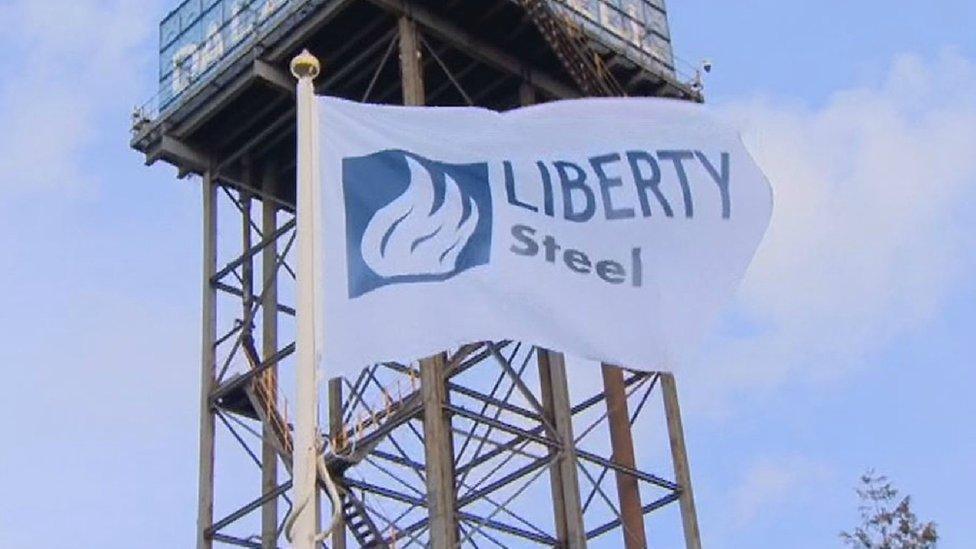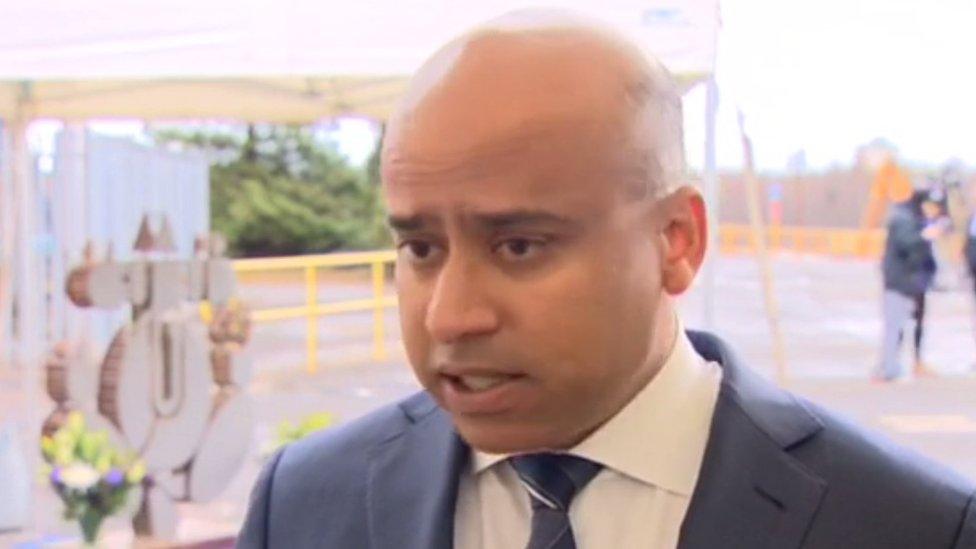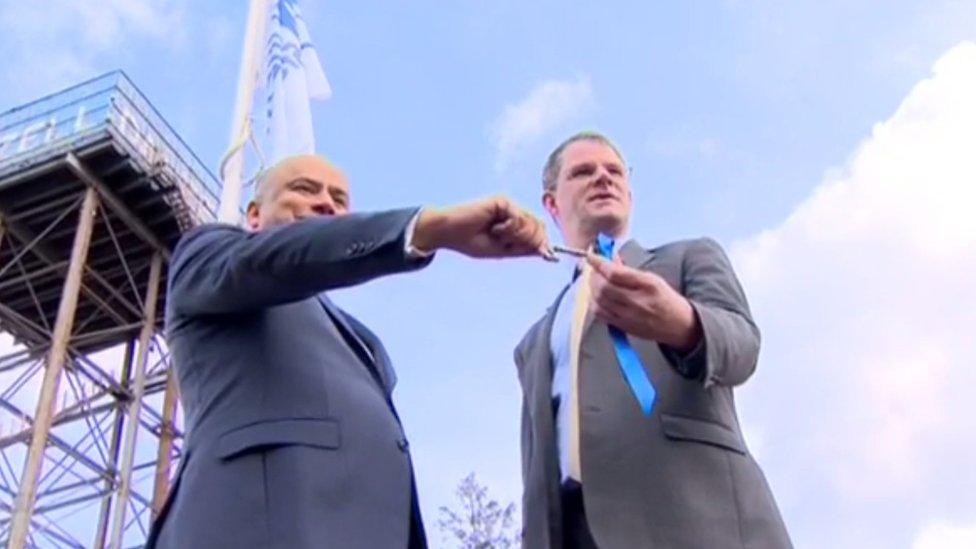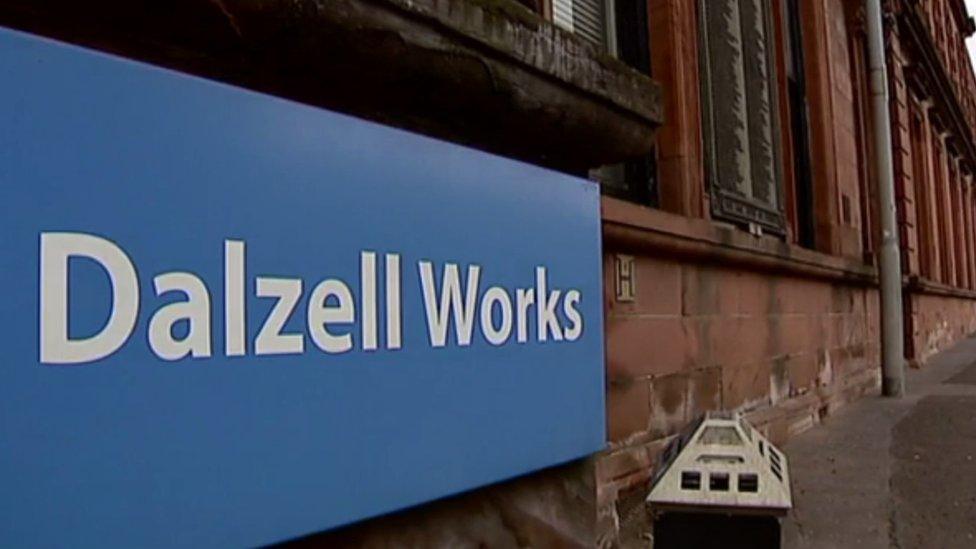What's the real steel deal?
- Published

From around 100,000 Scottish jobs in steel-making to only 20 - it has been a long retreat.
And a lot of effort is being put into raising that number to 150, with the takeover of two Lanarkshire steel plants by Liberty House.
These aren't just any jobs. Their status is (to make fair use of an over-worked word) iconic.
In the ebbs and flows of job loss and creation, they have long ceased to occupy the commanding heights of the economy. But they are part of the story the people of Lanarkshire and Clydeside tell about themselves.
It is a similar story that the workers of South Wales tell, though the job stakes at Port Talbot are a lot higher. They too have watched their traditional heavy industries decline.
Global power
Steel-making has been taken over, with vast over-capacity, by Asian giants with much newer plants and easier, more efficient access to raw materials.
It is surely a sign of the times that Scotland and Wales are in election campaigns where major themes include the transition of the remaining steel capacity from one Indian-owned conglomerate to an Indian-born entrepreneur with residence in Dubai and London, along with the pressure to secure investment funding from Chinese state corporations.

Sanjeev Gupta may be the saviour of the steel industry
Such foreign investment is, apart from a shift of global power, one of the economic consequences of Britain's chronic trade deficit, for which yet more evidence was published on Friday.
The imbalance in outflowing funds, to buy goods and services, is re-balanced by an inflow of investment, meaning assets being taken over by foreigners.
Chinese dumping
So how is Liberty House going to make Clydebridge and Dalzell plants work, where the experienced Tata Steel could not?
It mostly comes down to a different business plan. Sanjeev Gupta, as executive chairman of Liberty House, does not need to buy "long product" steel (the variety typically for construction, railways and heavy goods) from Scunthorpe, as Tata has done.

Liberty House took over the Scottish plants at an official ceremony
He can go to the international market where steel "slab" is trading very cheaply. China is the country with huge over-capacity in production, dumping it on world markets at less than cost. That drives down the price also of the Russian and Brazilian steel that Liberty House is buying.
(If EU objectors to Chinese steel dumping are successful, of course, it will make imported steel more expensive, and may cause problems for the Liberty House business model.)
Costs need to fall as well. That includes energy, with heavy industrial users being relieved of some green levies, on the grounds that shifting business to Asia, which has cheaper fuel without the green levies, is no way to help the global environment.
Blast furnaces
Then there are labour costs. The Lanarkshire plants had 270 people before they were mothballed, three months ago. Twenty remain, in a caretaker role.
Only another 130 are likely to be taken on this year. And having been laid off, they will be re-hired on new pay and conditions.
That much seems to be accepted by the unions. What they fear is that Tata and Liberty House will learn this lesson from Lanarkshire and try the same in Port Talbot and the processing plants it supplies.
If Tata lays off its workforce in Wales and England, retaining just enough to keep the blast furnaces hot, then Liberty House can re-hire workers a few weeks down the line on terms it can dictate.
The other approach is being taken in Scunthorpe, where the Tata plant which has supplied Clydebridge and Dalzell with "slab" is being taken over by Greybull Capital.
It plans to retain much of the workforce, but is requiring changes to pay and conditions, on which the unions are currently balloting. Their choice is between new conditions or no job, and the deal could be done as soon as Monday.
Thrashed out
An important bit of the Liberty House business plan is securing a customer base. That may play to the new owner's strength, as a trader of steel and other commodities.
But unions are looking to see the detail of the deal - which is still being thrashed out - wanting governments in Edinburgh and Westminster to ensure that public procurement contracts do everything within European law to support UK suppliers.

If they are, the pressure to buy construction steel from Liberty House will be an interesting part of any discussion with future Chinese infrastructure investors.
But we haven't seen the deal yet, because it hasn't been completed. We've had a signing ceremony and a handover, flag-raising ceremony. But this has so far been an agreement to do deal.
And we had one of these already. Tata was going to sell to the US-based Klesch Group, and signed a Memorandum of Understanding. But last year, Klesch pulled out, later claiming that the UK government had not been willing to provide sufficient support.
One element that's not entirely clear about the current deal is why the Scottish government is taking on the plants from Tata and immediately handing them on to Liberty House.
Such "back-to-back" deals are usually done while restructuring a company - the accountant euphemism for shedding a lot of liability in order to become solvent, handing assets to a new owner, with much less debt. We're assured that the taxpayer is not taking on any financial liability in the back-to-back process.
The reason given by the Scottish government is that this reduces the time taken for due diligence, ie checking through the business numbers and legal details. All that extra checking time would have served to reduce risk to buyer and seller.
But by hurrying the process, it increases risk - which makes you wonder whether buyer, seller or intermediary has taken that risk on.
Dizzying pace
Making this business plan work is a tall order for the Liberty House team now being put together. The 150 job target is "dependent on market conditions". And market conditions have been atrocious.
It is an even bigger ask for a company that does not have much of a track record in manufacturing steel. The Gupta family conglomerate does lots of things. Steel trading has been only one of them, building big turnover, with more modest profit.
Liberty House has not been long in production of steel. And it is growing at a dizzying pace.
With assets coming on the market for pennies (the Lanarkshire plants are understood to be changing hands for one solitary pound), they bought a plant two years ago in Newport, South Wales and several Midlands firms.
Dozens of shell companies have been set up which, as Sanjeev Gupta told Newsnight, would be useful for further acquisitions.
Taking over and turning around Port Talbot would be a big ask of any management team. But doing all these things at one time is a seriously big stretch.
Doing so under political and public scrutiny may not make it much easier. But that, too, seems to be part of the business plan.
Liberty House seems to be adept at exploiting public pressure on Westminster, Holyrood and Cardiff governments to save such industries, and at times when ministers are most vulnerable to voters.